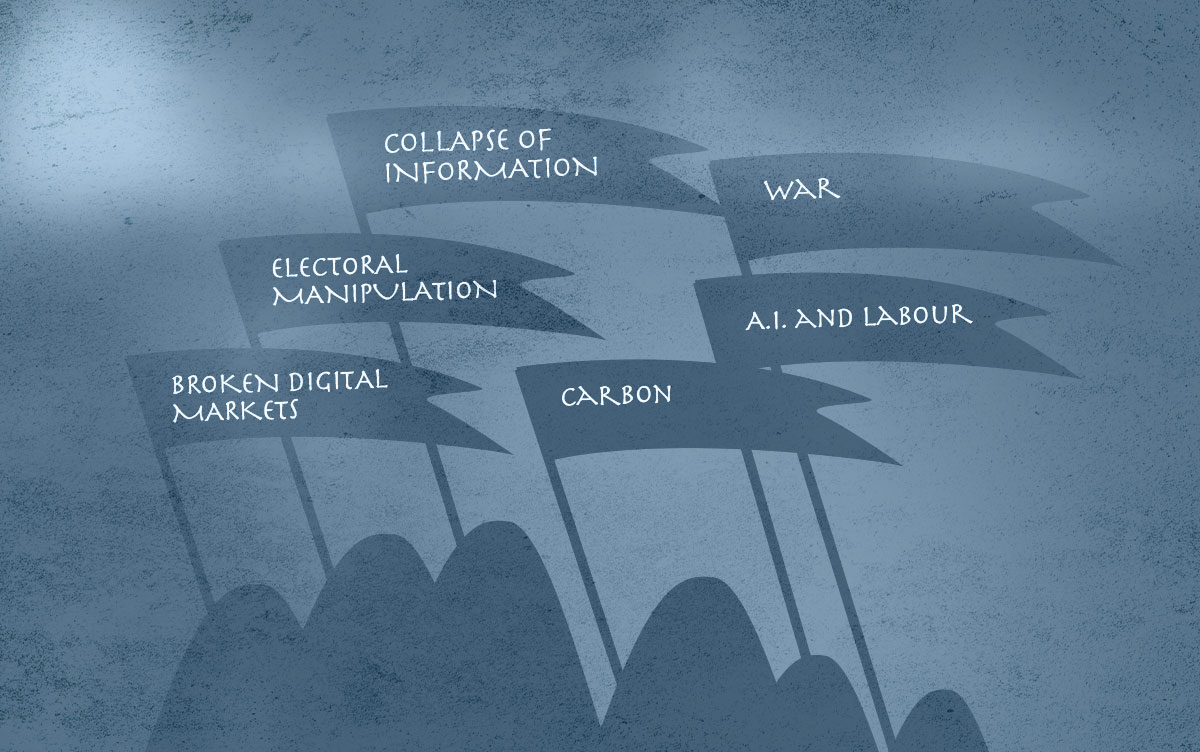How the Next Commission can Confront the Six Horsemen of the Digital Apocalypse
13 May 2024

The European Union has made bold advances over the last half century. But the next President of the European Commission will decide whether the European way of life endures. When she or he takes up their role later this year, the next Commission President will immediately be confronted by six horsemen of the digital apocalypse. The President must marshal Europe’s diverse powers and resources, and build a unifying structure and vision to tackle these grand challenges.
The Six Horsemen
Horseman one: Collapse of information in our democracy
Social media’s hidden algorithms push a personalised diet of hate & hysteria into each person’s feed. Social feeds claim to be a true window on the world. But in fact they push a personalised diet of hate, outrage, and angst calculated to keep you glued to your screen, so you can be shown more ads. Big Tech artificially amplifies hate and hysteria, manipulates and addicts our children, promotes suicide and self-loathing among our teens, and turns our communities against each other.
At the same time, the broken and fraud-riddled online advertising system is crushing journalism and funding disinformation. Conventional online advertising operates by broadcasting sensitive (but commercially valuable) data about journalism’s readers. This data free-for-all enables disinformation websites to trade off that data. Thus, previously unprofitable disinformation has become profitable, while journalism is no longer sustainable. In parallel, the system enables massive “ad bot” fraud estimated to cost businesses tens of billions of Euros.
Horseman two: Electoral manipulation
The data free-for-all in online advertising is a goldmine for anyone who wants to interfere in Europe’s elections. It exposes every voter to profiling and personalised manipulation. Whether or not our own political parties are sophisticated enough to do this, we must not underestimate foreign states and non-state actors.
Horseman three: Broken digital markets
The market is broken. Big Tech corporations have swallowed every digital market, killing new competitors, and preventing better alternatives from emerging. We have allowed them to unlawfully misuse everyone’s data to cascade their power and dominance across many lines of business.
The broken market makes it impossible for European innovators and SMEs to contest the market. Instead, Big Tech corporations skew prices, products, and working conditions to suit their needs. This will get worse with A.I.
This undermines consumer choice, European competitiveness, and democratic oversight.
Horseman four: War
With war on Europe’s borders, we have been too lax about our security and protecting data. For example, we allow China’s internet-connected “Hikvision” cameras with built-in facial recognition to be almost everywhere in the EU. In Dublin, where I live, they are on every street, in our military bases, and our parliament. Hikvision is the camera of choice for both public and private sector because they are heavily subsidised by the Chinese Government.
Similarly, we have allowed the online advertising system to leak sensitive data about the EU and member state military, industry, and political leaders to entities all over the world, including China and Russia. This exposes them to hacking and blackmail, and undermines the security of our key organisations and institutions.
Horseman five: A.I. and Labour
A.I. will do more than displace jobs. An increasing number of human workers will find themselves answerable to A.I. systems that they are not allowed to know or understand. How will people react when unanswerable A.I. managers decide they get no bonus, or can’t take time off when their children are sick? This threat to human agency may cause widespread unrest.
Horseman six: Carbon
Each of these problems involves massive computers for data processing. This computational effort requires astounding quantities of energy, which, depending on a country’s energy mix, releases astounding quantities of carbon into the atmosphere.
Europe’s response
The issues are diverse, but connected: collapse of information; protecting children; electoral integrity; unassailable tech monopolies; security and war; labour; carbon. Any of these profound problems is enough to threaten our way of life. Together they are the great challenge of our age.
In the crucial half-year before they take up their role, the next President of the Commission must start planning now. We need a whole-of-Commission approach. Too often, the Commission’s many directorates and units work in silos, contradicting and cancelling each other. We propose a new structure to marshal Europe’s diverse powers and resources.
First, the next European Commission must adopt a whole-of-Commission approach. Too often, the Commission’s many directorates and units work in siloes, contradicting and cancelling each other. We need a new structure to marshal Europe’s diverse powers and resources.
The Head of Cabinet of the next Commission President should chair a Taskforce for a Sustainable Digital Future (media, protecting children, safeguarding democracy, security, free and open markets, future of labour, reducing carbon) with representatives from all relevant directorates.
Day-to-day coordination should be assigned to a dedicated Commissioner, who enjoys wide powers and is backed by the Secretariat-General. The Taskforce should set clear targets for Cross-Commission Teams in each of the six areas to deliver. The Taskforce must give regular progress updates to the European Parliament and to the Council.
Second, the next European Commission must abandon incrementalism. The rapid shift away from the dependence on Russian energy supply shows that Europe can act fast. As the six horsemen gallop toward us, Europe must act quickly and boldly.
Third, the next Commission must enforce European law. Though Europe’s most hyped law, the GDPR, has been the terror of small business, Big Tech has been largely immune from meaningful enforcement. The next Commission President must have the political will to press key member states to unblock GDPR enforcement against Google, Meta, Amazon, TikTok, etc.
Fourth, the next Commission should get serious about confronting tech monopolists. It should break up Big Tech monopolies unless they defy expectation and scrupulously obey Europe’s new Digital Markets Act (DMA). This should certainly include the major cloud providers, which the Commission has yet to designate as entities within the DMA’s purview.
The next Commission should also investigate building public technology that provides alternatives to tech monopoly. Otherwise, someone may not only hold the kill switch of our media, but of our emergency services, too.
Our democracy, children’s wellbeing, jobs, security, and way of life hang in the balance. The next European Commission must defend them.
ENJOYING THIS CONTENT?






